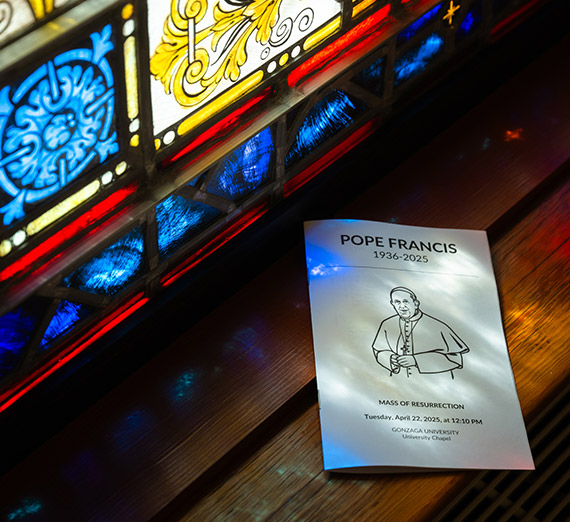What is a Jesuit? Understanding Pope Francis’s Religious Order

As the world mourns the death of Pope Francis, the first Jesuit elected to serve as the head of the Catholic Church, many are flocking to the internet to ask the question: What is a Jesuit?
Here, at Gonzaga, a Catholic Jesuit university, it’s a question we get a lot and one we’re happy to help answer as we reflect on the incredible life of Pope Francis.
As Meredith McKay, director of ministry at Gonzaga explains, it helps to begin with some broader context about where Jesuits fit within the Catholic Church.
Jesuit vs Catholic
“I like to think of the Catholic Church as an umbrella,” says McKay. She explains that the church is “big and overarching” with the Pope and his cardinals at the top.
“When we go beneath the Pope and the cardinals,” she continues, “on one side of this umbrella we have dioceses. These are organized around region or location, and each diocese has a bishop or archbishop, and they’re in charge of their particular location.
“On the other side of the dioceses, we have religious orders. Instead of being based around location, orders are based around an interest or what we could call a charism.”
Catholic religious orders include Franciscans, Benedictines, Augustinians and, of course, Jesuits. The Jesuits are also referred to as the Society of Jesus, and the two terms can used interchangeably. Jesuit priests have the initials, “S.J.,” after their name to mark their religious order.
Jesuit values
Jesuits are most known for their commitment to education, founding schools and universities around the globe. St. Ignatius of Loyola, the founder of the religious order, didn’t originally intend to make teaching a core tenant of the Jesuit tradition. But after the Jesuits opened their first school to lay people in 1548, he became an education champion, writing that it empowered people to become “laborers for the help of others.”
This belief continues underpin Jesuit education to this day. At Gonzaga, it can be seen in the first sentence of our mission statement, which declares our commitment to “…educating students for lives of leadership and service for the common good,” and it’s built into who we are as a University.
Beyond education, being a Jesuit centers on core beliefs, such as respecting differences, valuing independent thought and caring for others. These beliefs guide Jesuits’ work everywhere from parishes to refugee resettlements to schools and hospitals.
For Pope Francis, these values could be seen throughout his papacy. In a tribute to the late pontiff titled “Pope Francis never stopped being a Jesuit,” James Martin, S.J., highlights the ways the Ignatian tradition took shape in his leadership.
Drawing on the practice of “Ignatian contemplation,” Pope Francis often called on Catholics to use their imagination, asking them to envision themselves in gospel scenes or empathize with the lives of others. Martin, S.J., writes, “His Jesuit imagination was key not only to his preaching but his invitation for Catholics to identify with someone ‘on the peripheries,’ as he liked to say.”
Pope Francis’s empathetic approach could be seen his commitment to serving the poor and advocating for migrants and refugees, priorities which he made hallmarks of his ministry.
Martin, S.J., also cites Pope Francis’s use of discernment. In the Jesuit tradition, discernment means prayerfully seeking the best path forward. Martin, S.J., writes that this practice includes trusting that “…the Holy Spirit is at work in the individual and can work through anyone.”
Discernment can be seen in Pope Francis’s leadership as he showed a willingness to question the status quo and listen to new perspectives. He met with people who historically felt like they didn’t have a voice in the Church, heard their stories and changed the papacy’s approach towards groups such as the divorced and remarried and the LGBT community. Despite the controversies such actions incurred, he showed a commitment to honoring universal human dignity and a faith that the Holy Spirit is alive in all of us.
As we remember Pope Francis, we can celebrate not only the life of a great leader and a great Catholic, but a true champion of Jesuit values.
